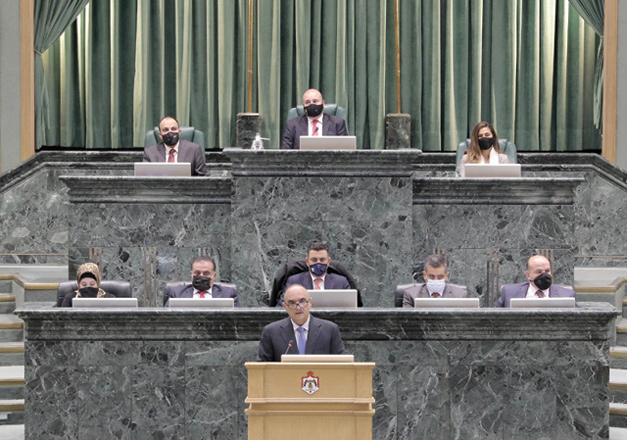AMMAN — Prime Minister and Minister of Defence Bisher Al Khasawneh on Sunday delivered the Cabinet’s policy statement to the Lower House in a session headed by House Speaker Abdulmunim Oddat, the Jordan News Agency, Petra, reported.
The government’s policy will be based on “facts, honesty, and transparency”, Khasawneh said, adding that the Cabinet “will not make promises it cannot fulfill”.
The prime minister underlined that the Cabinet, once obtained the House’s confidence, will put the policy into execution through a programme outlined by specific timetables and indicators to represent the level of progress, making it feasible for everyone to monitor and evaluate the government’s performance.
Voicing the government’s commitment to partnering with the Lower House, Khasawneh acknowledged the House’s legislative and supervisory rights guaranteed by the provisions of the Constitution.
The Cabinet and the Lower House came amid critical, exceptional conditions that require utmost caution and responsibility to serve national interest and realise His Majesty’s aspirations, he highlighted.
Prioritising people’s health, Khasawneh pledged to provide a healthcare system that goes hand in hand with local and international developments, noting that the government’s plans are not confined to tackling the spread of the coronavirus.
In regard to education, the government is keen on guaranteeing the gradual and safe return of in-class education, according to the developments in epidemiological situation in the Kingdom.
To mitigate the economic ramifications of the coronavirus, the prime minister mentioned that the government has launched a number of programmes last month, worth JD320 million, to aid sectors hit hard by the pandemic.
Khasawneh also announced the launch of an executive programme for the years 2021-2024 that is inclusive of a comprehensive approach to tackle economic, social and political issues according to national priorities.
The executive programme, implemented by more than 100 institutions, will cover 24 developmental sectors, Khasawneh noted, adding that the Cabinet is currently considering establishing an investment fund that the government and other external investment funds contribute to.
The prime minister also vowed to combat all forms of corruption and protect public money.
Concerning the Palestinian cause, he stressed that Jordan will continue to exert efforts to realise a fair and comprehensive peace according to the two-state solution which guarantees the establishment of the Palestinian state on the June 4, 1967, lines with East Jerusalem as its capital in accordance with international law.
By virtue of the Hashemite Custodianship over the Islamic and Christian holy sites, the Kingdom will also continue to protect Jerusalem against attempts to alter the historical and legal status quo, he added.
The House is scheduled to begin its deliberations over the government’s policy statement starting on Tuesday, with two sessions to be held each day.
The chamber allocated each parliamentary bloc 30 minutes and each MP 20 minutes to address the government’s policy statement, Petra reported.
As for the economic and social reform programme, supported by the International Monetary Fund for the years 2020-2024, the prime minister said that it focuses on public monetary reforms, limiting budget deficit through enhancing local revenues, addressing shortcomings in revenues and expenditures and implementing structural reforms in the energy, water, and labour sectors.
The premier added that this government was formed amidst the community transmission of the pandemic. The government tool all measures to boost the health capabilities in order to avoid the options of a comprehensive and a strict partial lockdowns.
In this regard, the government boosted the capabilities of the health system and enhanced its level of preparedness through increasing the isolation beds to 4,551, ICU beds to 981 and ventilators to 936, Khasawneh said, noting that the government succeeded in improving the health system by 300 per cent since assuming office on October 12.
He also said that the government established four public hospitals in Amman, Irbid, Maan and Aqaba with a capacity of more than 1,160 beds, 260 ICU beds, in addition to three field hospitals that were established by the Royal Medical Services with a capacity of 900 beds and 220 ICU beds.
The government has also appointed 920 doctors and 1,600 nurses to compensate shortages in medical staff, he said.
Despite the weak economic growth that went down to -3 per cent in 2020 due to the COVID-19 pandemic, Khasawneh expected the real rate for economic growth to stand at around +2.5 per cent in 2021.
Responding to Royal directives, the government has prepared a document to make Jordan a regional hub for food security, noting that the area of government lands that can be used for rainwater harvesting stands at some 20.7 million dunums.
